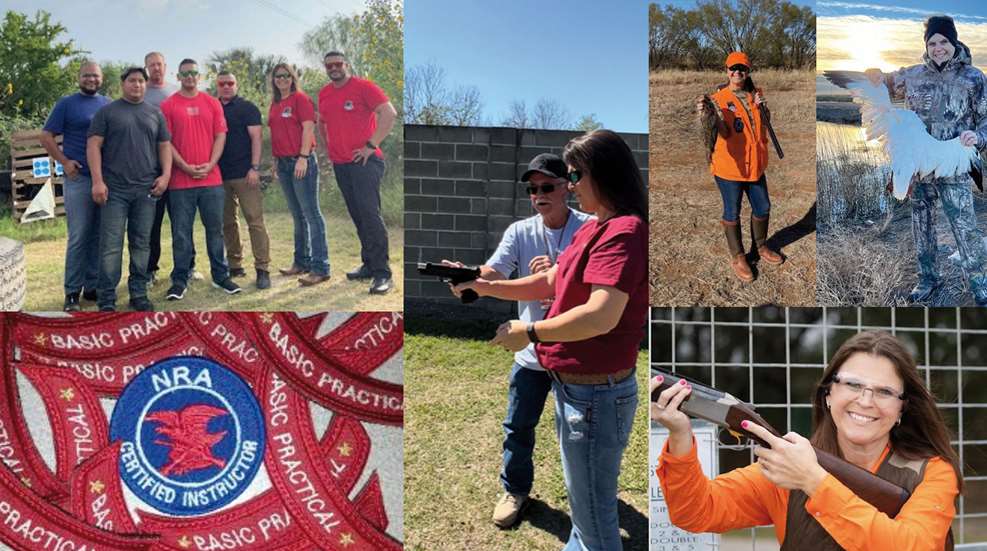Being a Markswoman in a Marksmanship World
What’s it like to be an active participant in traditionally male-dominated activities like hunting and shooting? This prolific NRA Women contributor offers her insight.
by HEIDI LYN RAO posted on August 31, 2023
Support NRA Women DONATE

Being a Markswoman in a Marksmanship World – NRA Women.com
I have spent my entire adult life in what has traditionally been a male-dominated world as it relates to firearms. I graduated college and went straight into the shooting and hunting world in the mid-1990s. I began my career as the Assistant Hunter Education Coordinator and the Becoming an Outdoors-Woman Coordinator for the state of Texas, and still hold these positions today. I am also an NRA Training Counselor, certifying instructors in the various NRA Firearms Disciplines. My husband and I have raised our four boys to respect and enjoy firearms and the shooting sports. My passion is firearm safety and introducing and training others to develop this same interest.
Sometimes people ask me questions about being (sometimes the only) female in male-dominated activities. I tell them that there definitely are areas that can be challenging. Some of these areas include instructor challenges, writer challenges and hunter challenges.
I refer to these as “challenges” and not barriers even though the word “barrier” is a term that is overused quite a bit. Our current social norm is to create victims and that is what the word barrier does. A barrier is something that is put up to block or keep something out. I do not consider myself a victim facing barriers, but rather a participant who has experienced some challenges along the way. Learning how to recognize and meet a challenge head-on will help you become successful in any endeavor.
Instructor Challenges
Being a female firearm instructor in a traditionally male-dominated arena when it comes to firearm training, has been a mostly pleasant experience. Fortunately, most men who have contacted me in their search for firearm training, have been respectful and talk to me as an “NRA Firearms Instructor” and not as a “Female NRA Firearms Instructor.” This is important for the students because it allows them to have an open mind, so they can be trained.
According to the NRA Trainers Guide, there are eight fundamentals for effective training. The very first fundamental is the student must have a desire to learn. If the student cannot get over the fact that their instructor is a woman, then they are probably not going to be a very good student. It would be easy to dismiss this attitude and say that it is their problem, but I actually take this opportunity as a challenge. If I am a good instructor, I should be able to teach them something to gain their confidence. Once I gain their confidence, they can be taught.
Many times, when I am setting up an NRA Firearms Training Course, students, after learning that I am female, will tell me all about their shooting experience, list their credentials, and then offer to help me in the class. My response to the offer ensures that I maintain a good atmosphere for learning. Instead of “putting them in their place” or refusing the offer, I thank the student and tell him or her that I welcome their experience in the classroom. It is when the class starts, and I demonstrate my knowledge of the topic, that the student feels like he or she is getting their money’s worth. I still welcome any additional information from any of my students.
Yet, there are still some male students who think they need to “help” me teach the class. If it is not disruptive to the class, I let him “help.” I handle this individual by giving them something to do. For example, if I have a training aid to pass around, I might have him walk it around the classroom from table to table. If he starts to become a distraction to the other students’ learning environment, I might have to counsel him during a break, or thank him for his assistance, and ask the students to keep any comments relevant to the topic being discussed. I always offer the opportunity to ask off-topic questions when we finish a lesson or during a break.
In the end it does not matter if you are a male instructor or a female instructor. All that matters is whether you are a good instructor or bad instructor. Being a female does not define me as an instructor. What defines me is if my student has taken in all the information presented, and in the end, winds up shooting much better on the range after the training than he or she was before attending class.
Writer Challenges
As a female instructor, shooter and outdoor writer, I reach more people than other activities I participate in through my writings. I have written for several periodicals, posted articles on my website, authored nine books, and made many firearm safety videos for the state of Texas and the Texas Parks and Wildlife PBS television show. Because I reach so many people, it can be the most challenging for me. This seems to be where I am challenged the most by men who consider themselves as “experts.”
Occasionally I receive emails from one of these “experts” challenging a topic that I have written about. One time I received a lengthy email from an individual questioning me on how to handle loose components on a firearm by periodically checking and ensuring all screws are tight. He started by telling me he has been shooting his entire life and said that I was unprofessional, arguing the point that I should have told my readers to remove all screws and use Red Loctite on them before reinserting them, since this was the strongest grade of thread-locking adhesive, and provides the highest level of resistance to vibration, shock and torque. He then attached his “American Motorcyclist Association” credentials in his closing. Obviously, having nothing to do with giving him any credibility as a firearm “expert.”
NOTE: Do not ever use Red Loctite on your firearms!
I have three options when I am challenged by others. I can ignore them, I can argue with them, or I can learn from them and become a better writer. I choose to learn from them. Sometimes the problem comes from the way something is worded, and my reader reads it a different way than I meant it. This teaches me to be more concise with my words.
I approach writing as if I will be challenged with everything I write. As such, I do a lot of research and I can back up everything I write or say with credible and cited documentation. Occasionally, an “expert” tactfully tells me in a roundabout way to stay in my lane and leave certain topics to men. I had an individual write to me once and told me he was the subject-matter expert on a particular topic I wrote about, and everything I said was wrong. Interestingly, he refused to tell me specifically what was incorrect in my article, rather continued to tell me I was wrong.
I like being challenged for several reasons. First, it makes me a better writer. Second, I feel I am being taken seriously enough as a writer when I am challenged by a reader. I never take criticism personally. I also understand that male counterparts get challenged too. I consider myself as a writer, not as a “female” writer, just like my male counterparts consider themselves as writers.
Hunter Challenges
Hunting, without doubt, is a male-dominated activity, although women are dramatically increasing their participation numbers. When I first entered this field, many of my male hunting counterparts often had the attitude that women do not know how to hunt. While many women do not have as much experience as many men in the field, women tend to do their research. This is what I did. I learned as much about hunting as I could from as many different people as I could surround myself with.
I had a different approach to being constantly “told” how to hunt. Instead of pushing back and telling all the men who wanted to help me that I did not need their help, I welcomed it. There is always something to learn. I take all the advice I can get and then sort through the information looking for anything new I could use. My advice to anyone new to hunting, male or female, is to be a sponge and absorb all the information you can.
It is common for hunters to help each other with camp duties, tracking game and field dressing. I always helped others with their chores and the courtesy was always returned when they helped me with mine. I never turned down help, and I never refused to offer my assistance to others. That said, the biggest challenge I have encountered while hunting is meeting others in the field or camp and watching a male counterpart take the attitude, “If she wants to hunt, then she can do it all by herself.” When I’ve experienced this, I immediately knew I would not be able to count on this individual for help if I needed help. Were I to find myself in this situation, I would just have to put my mind to it and get whatever I was doing, done.
When I am asked questions related to being a woman in and around the shooting world, my answers have always been the same. It is awesome! I accept the fact that some will question me or my abilities. There is nothing wrong with that if they are respectful and, for the most part, everyone has been. I realize that I may be challenged or questioned more than a male would be in my position. That only inspires me to work harder to “prove” myself.
Some people would then ask me why I should have to prove myself. My response to them is respect that is earned is more valuable than respect that is given. If someone gives you something, they can take it away. In other words, if someone gives you respect, they can take it away but if you earn it, it is yours to keep!
